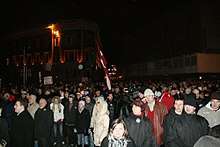2009 Riga riot
2009 Riga riot was a civil unrest in Riga, Latvia on January 13, 2009.
| 2009 Riga Riot | |
|---|---|
 Meeting before riots | |
| Location | Riga (capital of Latvia) |
| Date | January 13, 2009 17:30 (EET (UTC +2)) |
Attack type | Damage of public and private property, rebellion. Attempt to take by assault the building of Parliament of Latvia. |
| Weapons | Rebels: different objects (eggs, stones, bottles, etc.), and bottles filled with inflammable mixtures. Military and police: batons, shields, teargas. |
| Injured | more than 50 |
| Perpetrators | individual rebels; more than 100 arrested |
No. of participants | Directly involved: several hundreds Protesters: around 10,000 |
| Defenders | Public Order Police and its Special Unit "Alfa" (State Police), Military Police (National Armed Forces), and Riga Municipal Police. |
The opposition and trade unions organized a rally requesting dissolution of the parliament.[1] The rally gathered some 10–20 thousand people. The rally was because of the recent economic crisis that struck Latvia in 2009 and made more than almost 70% of the Latvian population either poor or unemployed. Once one of the growing economies in Europe, Latvia was struck in 2009 by the crisis. In the evening the peaceful rally turned into a riot. Fifty people were injured and 100 arrested for overturning police cars and looting stores.[2] The crowd moved to the building of the parliament and attempted to force into it, but was repelled.[3]
On February 20, the cabinet of Prime Minister Ivars Godmanis was dissolved and Godmanis resigned his position as head of the government.[4]
See also
- Credit Crunch
References
- "Archived copy". Archived from the original on 2009-02-11. Retrieved 2010-11-23.CS1 maint: archived copy as title (link)
- "Archived copy". Archived from the original on 2009-06-15. Retrieved 2009-11-09.CS1 maint: archived copy as title (link)
- Latvian Financial Crisis - the multi-billion-euro Parex/EBRD/Ernst&Young fraud. 26 June 2012 – via YouTube.
- "Crisis and Rallies Removed the Latvian Government" Archived 2009-06-05 at the Wayback Machine (in Polish)